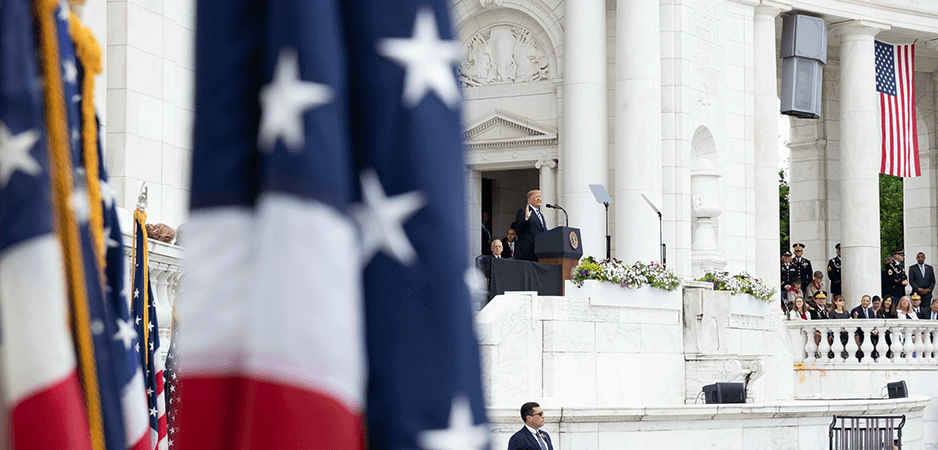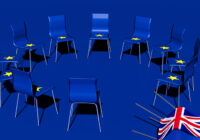A looming trade war makes Brexit less attractive for both the United Kingdom and the EU.
In the increasingly likely event that US President Donald Trump follows up on his steel tariffs by imposing similar measures on European car imports on so-called “national security grounds,” we can expect a full-scale trade war to erupt with no end in sight.
This will have disproportionate consequences for Ireland. A recent report by Bruegel, a Brussels-based think tank, estimates that 7.8% of the aggregate value added of the Irish economy comes from final products sold in the US market. This is far more than for any other European Union member and is twice the comparable figure for dependence on US sales for Germany, the Netherlands and Spain, and three times that for France and Italy.
A disruption of trade links with the US, combined with the effects of a hard Brexit in Britain, could do deep damage to Ireland — socially, politically and economically. Indeed, Trump’s actions change the entire context of Brexit.
G-7 Summit
The language used by President Trump about Canadian Prime Minister Justin Trudeau after the G-7 summit was shocking. He treated the Trudeau as if he was a domestic political opponent, not the prime minister of a friendly country, whose citizens gave their lives in common cause with the United States in both World Wars. It contrasted starkly with the language he used about the North Korean leader, Kim Jong-un.
Berating allies and flattering enemies is a low-risk approach in the short term. It is dramatic and gets attention in ways that diplomacy never can.
The drama seems to be working well in the US primaries, where President Trump’s allies are doing well. But trust in the United States is being undermined, and the prosperity of the developed world is being put at risk. The damage may long outlast the Trump presidency.
The US has had trade disputes with allies before, but they have never been supplemented by personalized attacks on foreign leaders. Trump’s imposition steel tariffs on the EU, Canada and Mexico suggests that the president believes he cannot rely on these countries to continue supplying steel to the US in war time. There is no basis in reality for such a contention, especially with regard to Mexico and Canada, which are US neighbors.
The EU will retaliate by imposing selective tariffs on US goods, though only on half the scale of the US steel tariffs. It will also take a case against the US before a World Trade Organization (WTO) panel. Canada and Mexico will do likewise. Given the way President Trump reacted to a difference of opinion about a mere communiqué from a G-7 summit, one can expect his language to escalate when the EU, Canadian and Mexican tariffs begin to bite.
It could be argued that the EU, Canada and Mexico should not bother retaliating, because the US steel tariffs will do the most damage to the American manufacturing industry and make it less competitive, but that is a difficult concept to communicate. So too is the argument that the US trade deficit is not due to unfair trade by others, but to the fact that Americans borrow and spend too much abroad, and are encouraged to do so by the lax fiscal and debt accumulation policies of successive US administrations.
President Trump is now contemplating imposing tariffs on cars coming from the EU, Canada and Mexico on the same national security grounds. He has initiated a legal process leading to that. On the narrow issue of cars, there is a difference between the rate of EU and US tariffs. The US tariff is 2%, whereas the EU tariff is 10%. That, of course, means US consumers have cheaper cars and a wider choice.
The EU could reduce its tariff on US-manufactured cars to 2%, but under the most favored nation principle by which the WTO, this would mean that the EU would also have to reduce its tariff on cars to 2% for all WTO members, including Japan and China.
#FBF: One week ago today, #G7 leaders gathered together for #G7Charlevoix. Here are some of the highlights: pic.twitter.com/bY7pajThAU
— G7 Canada (@g7) June 15, 2018
The tragedy is that President Trump’s initiative is driven by electoral politics, not by economic reality. He is breaking up the rules-based international trading system that the US itself established in the aftermath of the Second World War and is operated by the WTO. The US has a poor record in implementing WTO decisions on disputes, partly because this requires action by Congress, and the administration can claim not to control Congress. In contrast, China has a good record so far in implementing WTO decisions.
Even under former President Barack Obama, the US was failing to appoint US judges to sit on the WTO disputes resolution panels, thereby undermining the WTO disputes resolution system. This is despite the fact that the US has won 87% of the cases it has taken to WTO panels. The disputes settlement mechanism was one of the great achievement of the late Peter Sutherland as head of the WTO.
The US sometimes feels it can get along fine without the rest of the world. Given its vast area and resources, it is understandable how it might come to think like that. For much of the 19th century, it acted on that basis. That illusion finally ended at Pearl Harbor in 1941.
Isolationism is no longer an option for the US. China is rising in global importance. Its economy is already as big as that of the US. It is attempting to build a global infrastructural and technological system centered on China, not the US. That is the rationale of the “one Belt One Road” initiative and of China’s plan to be the industry leader in the technologies of the future like solar power, electric cars and gene editing.
A wise US leader would be seeking to compete with China by building closer economic ties with its allies, rather than using them as punch bags in a political show designed to win votes in the midterm congressional elections in November.
Brexit
The G-7 spectacle should prompt deep reflection on this side of the Atlantic. A looming trade war makes Brexit less attractive for both the United Kingdom and the EU. Both parties need to take time out to think. It is a pity that the time limits in the Brexit process do not allow both sides to take a moment to develop a wider strategic view of their mutual interests before the UK leaves the European Union. This needs to be reconsidered in light of the prospect of a bitter trade war with the US and the rest of the developed world.
Such a strategic review cannot be completed by October. An extension of the Article 50 time limit for the Brexit negotiation makes far more sense now than it did a month ago. Time limits create tension, but right now it is reflection that we need.
The views expressed in this article are the author’s own and do not necessarily reflect Fair Observer’s editorial policy.
Photo Credit: The White House
Support Fair Observer
We rely on your support for our independence, diversity and quality.
For more than 10 years, Fair Observer has been free, fair and independent. No billionaire owns us, no advertisers control us. We are a reader-supported nonprofit. Unlike many other publications, we keep our content free for readers regardless of where they live or whether they can afford to pay. We have no paywalls and no ads.
In the post-truth era of fake news, echo chambers and filter bubbles, we publish a plurality of perspectives from around the world. Anyone can publish with us, but everyone goes through a rigorous editorial process. So, you get fact-checked, well-reasoned content instead of noise.
We publish 2,500+ voices from 90+ countries. We also conduct education and training programs
on subjects ranging from digital media and journalism to writing and critical thinking. This
doesn’t come cheap. Servers, editors, trainers and web developers cost
money.
Please consider supporting us on a regular basis as a recurring donor or a
sustaining member.
Will you support FO’s journalism?
We rely on your support for our independence, diversity and quality.






